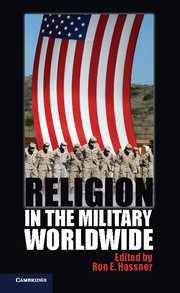Book contents
3 - United Kingdom
Published online by Cambridge University Press: 05 June 2014
Summary
The role religion plays in the British armed forces is a function of the close relationship between the monarch, the government, the Church of England, and the British armed forces as well as the complex role religion performs in modern British society. The Church of England, also known as the Anglican Church, is the officially established Church in England (hereafter “the Church”), whose supreme governor is the British monarch. Twenty-six bishops of the Church, known as the Lords Spiritual, hold seats in the Upper House of Parliament, the House of Lords. In addition to taking part in the debates in the Upper House, the bishops read Christian prayers at the start of each daily meeting. The British monarch, the British Parliament, and the British armed forces have enjoyed important historical and legal links. Because the Queen, as head of state, is nominally head of the armed forces, they are often referred to as “Her Majesty’s Armed Forces.” Officers, soldiers, marines, and airmen all swear their allegiance to the Queen. In practice, however, executive authority over the military is vested in the office of the prime minister and his cabinet.
Statistics regarding patterns of belief in British society and in the British armed forces paint a deceptively simple picture. In the 2001 official census, 72 percent of citizens in the United Kingdom – or 42 million individuals – registered as Christians. Only 15.5 percent indicated that they had no religion. These figures, together with the presence of beautiful churches in practically every country village – not to mention numerous churches representing different Christian denominations in most towns as well as large, impressive cathedrals centrally located in most cities – would suggest that Christianity plays an important part in the life of the nation. Similarly, records from April 2010 show 85.8 percent of the British armed forces registered as Christians. This figure represented 162,140 personnel, a reduction of some 7,900 from April 2007. In addition, the number of regular forces personnel citing “no religion” increased from 17,980 in the year 2007 to 23,770 in the year 2010. Personnel registered as being from other major faith groups numbered 1,930, and 870 personnel registered as belonging to “other religions.”
- Type
- Chapter
- Information
- Religion in the Military Worldwide , pp. 68 - 88Publisher: Cambridge University PressPrint publication year: 2013
References
- 1
- Cited by

